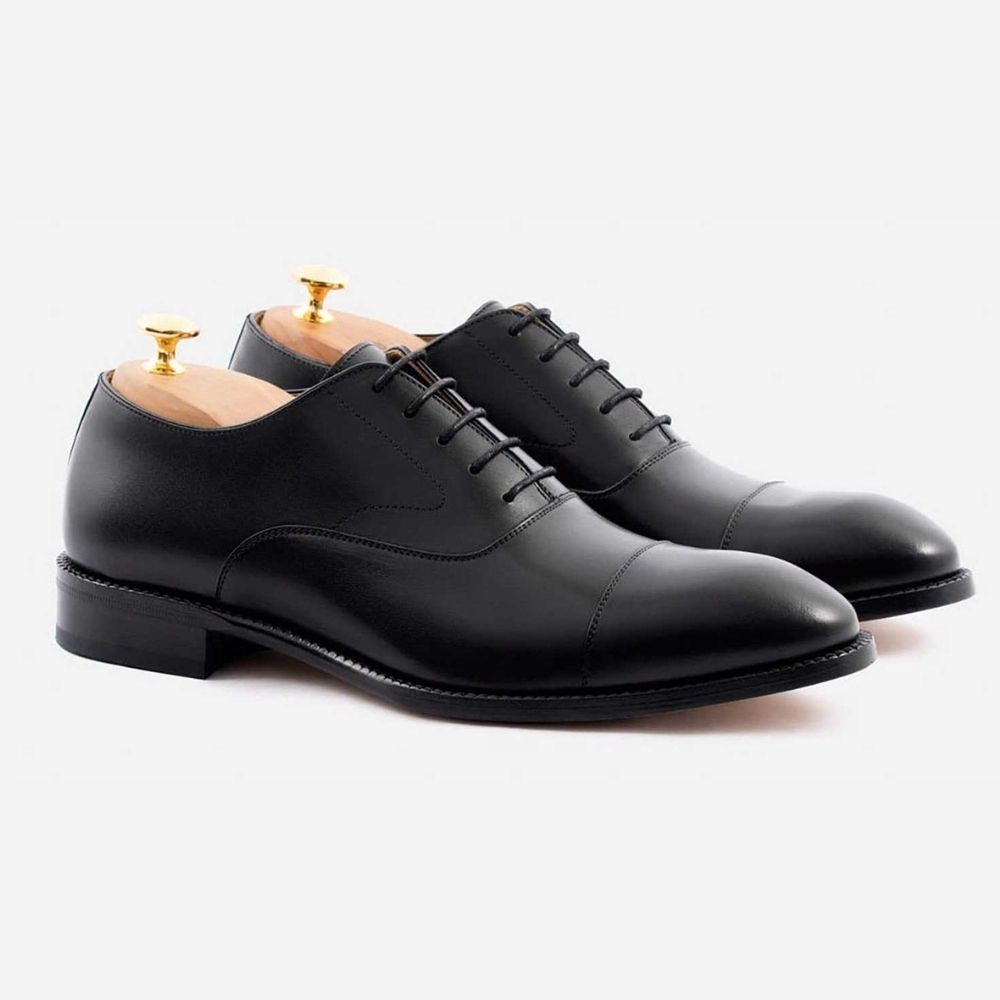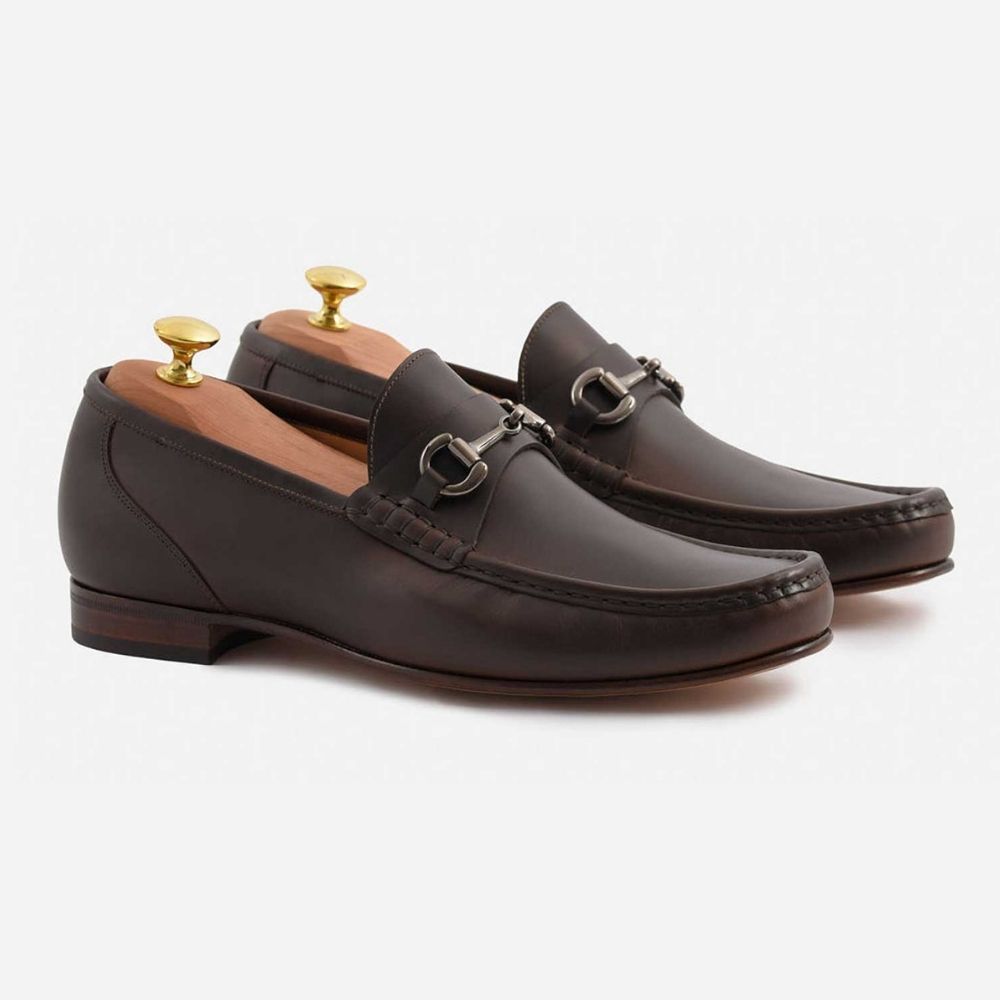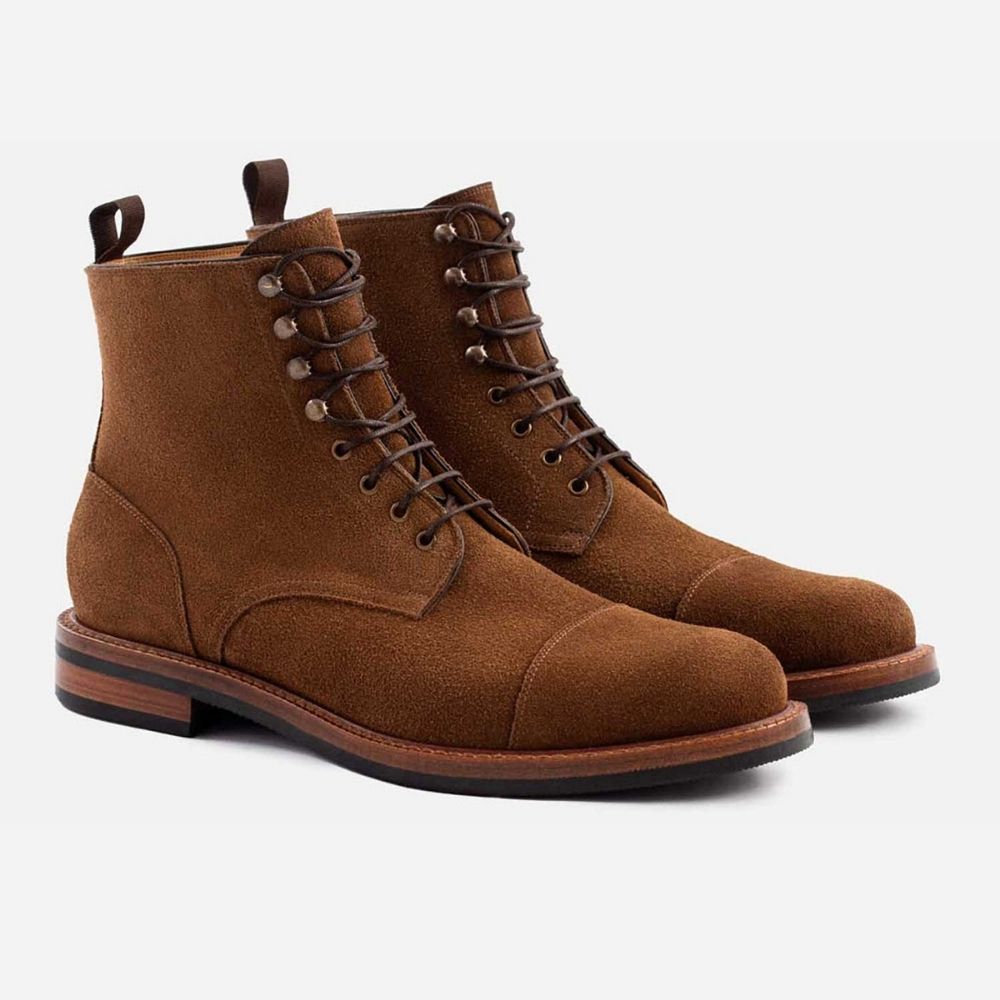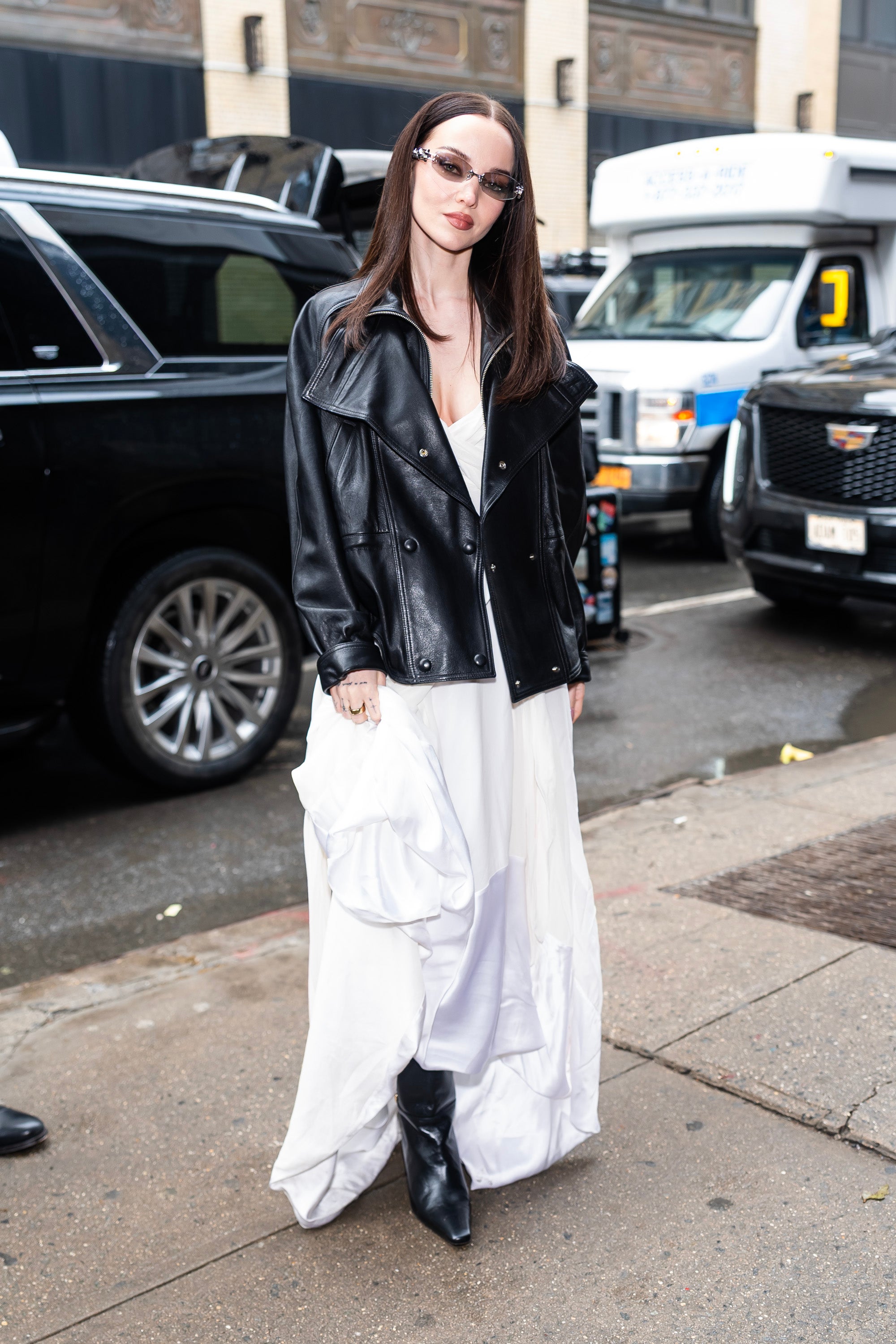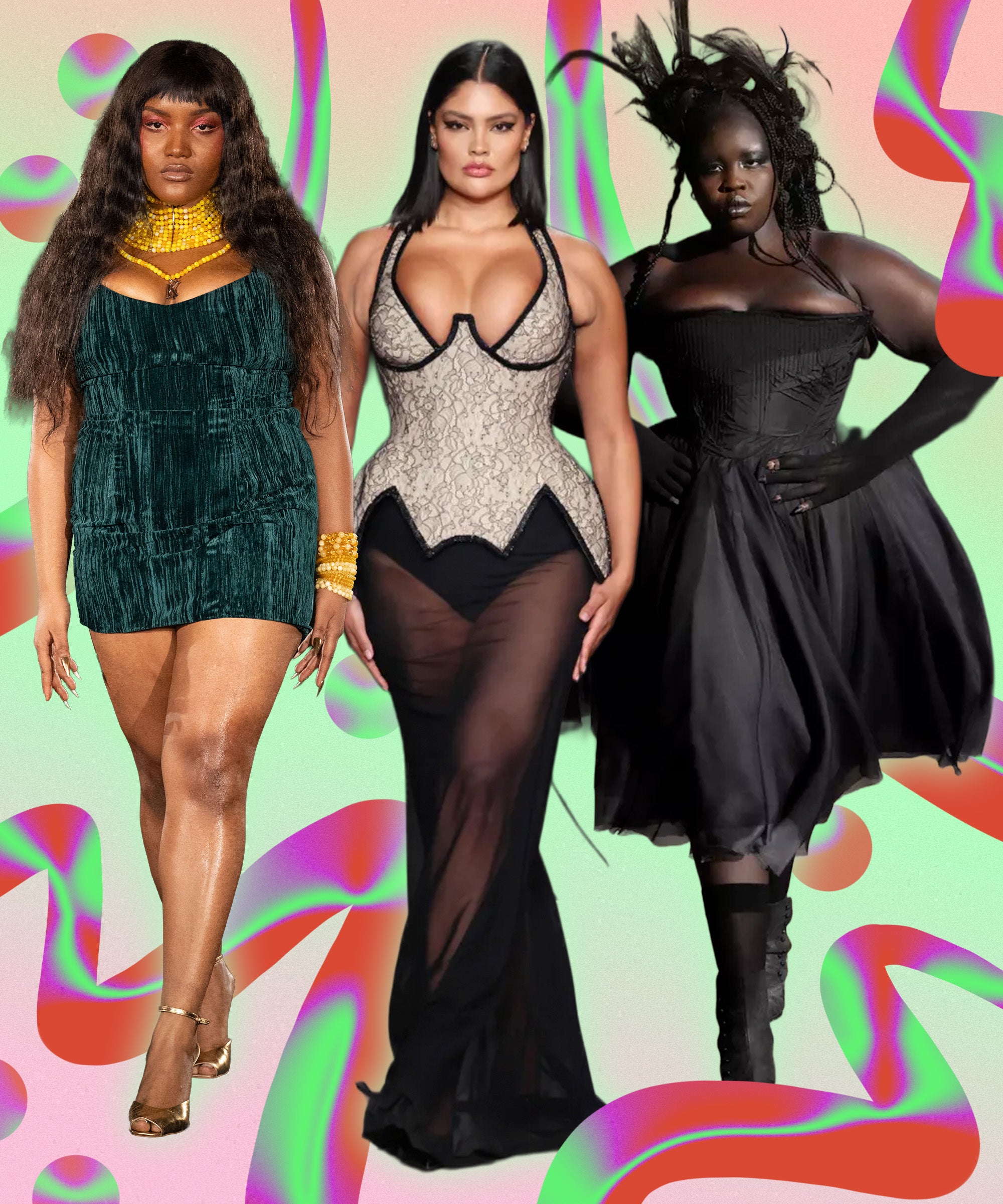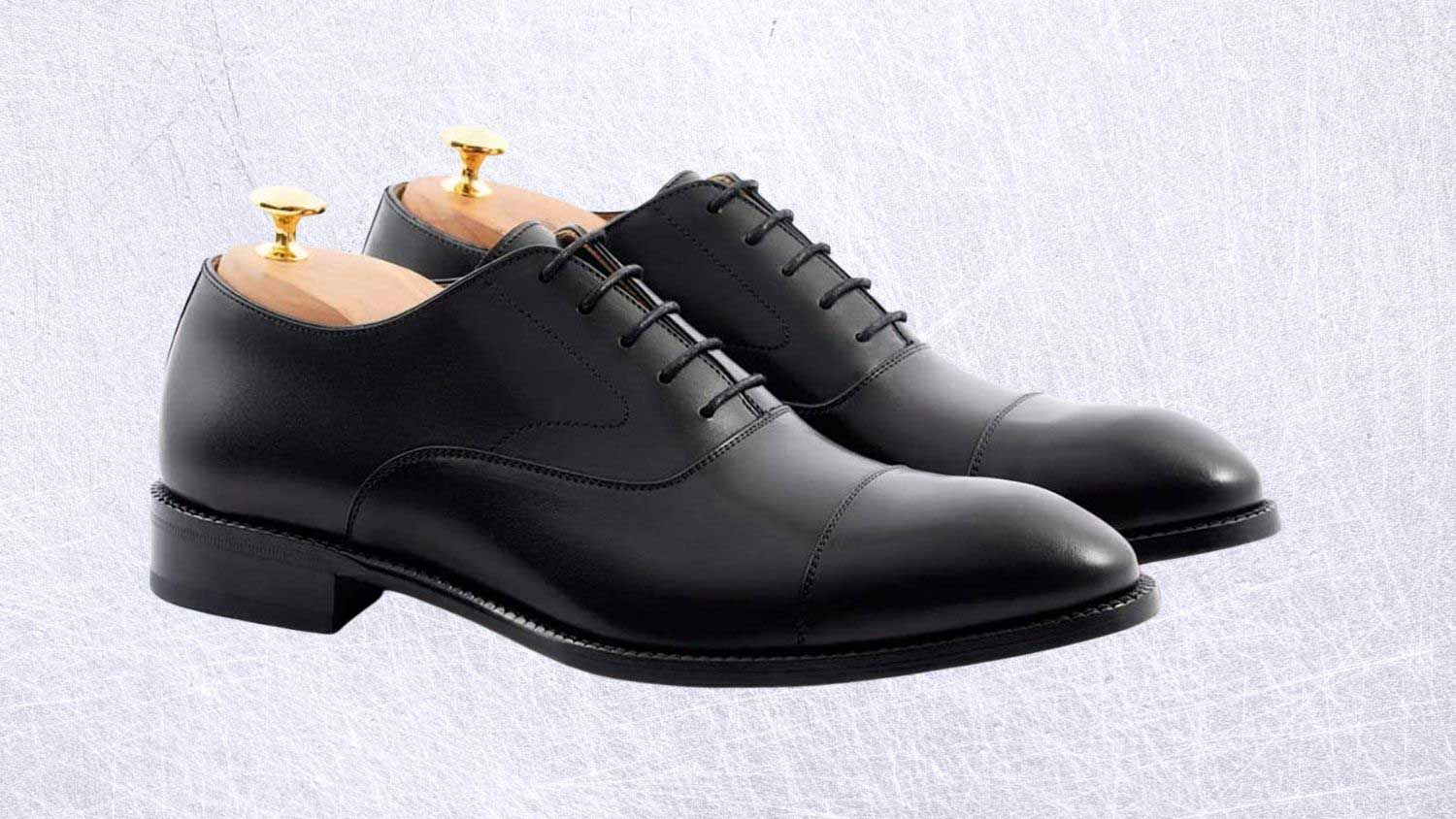
from He Spoke Style – Men’s Style, Fashion, Grooming, Tips and Advice
Are They Better Than Allen Edmonds?
In addition to ‘direct-to-consumer’ and ‘quality’, words like ‘ethical’, ‘sustainable’, and ‘made in small batches’ get tossed around quite a bit in this new age of #menswear. They’re used almost as a counterpoint to the key discriminators for many heritage brands. Beckett Simonon is one of those companies riding the wave.
Beginning in the early 2010s, this small leather goods manufacturer has evolved to feature a full range of reasonably priced dress shoes, loafers, boots, sneakers, and bags.
In this deep-dive review, we’ll take a look at the Beckett Simonon story, ordering and manufacturing process, and then review some of their more popular styles to tell you what works, what doesn’t, and how they stack up to the perennial elephant-in-the-room: Allen Edmonds.
An Overview of Beckett Simonon
Nicholas Hurtado and Andrés Niño, two longtime friends, had a small leather goods business early in their careers. Called “Hasso,” the brand was successful and eventually sold in some 13 countries. But, in the course of building the company, the pair saw a darker side of retail.
Third-party vendors for Hasso products would often charge six, eight, and even 10 times their manufacturing cost, marking up their items to cover the cost of paying for storage of unsold merchandise. Not only was this exploitative of consumers, but wasteful for the labor of producers and the supply chain needed to make these goods. Even more, the phenomenon of ‘need-it-now’ instant gratification actually created less respect for the items. There had to be a better way.
Beckett Simonon had its genesis, then, in a spirit of respect for the planet, supply chains, and the hands making your goods. But, its name came from an unusual combination of literature and punk rock. “Beckett” is a reference to the renowned Irish poet, playwright, and Nobel Laureate Samuel Beckett; Simonon a nod to Paul, ace of bass for The Clash.
When the company began in 2012, Hurtado and Niño priced their shoes at just $79. There was no Kickstarter, no splashy launch video or even Adwords. But, thanks to a combination of luck and some timely forwarded emails in their network, the initial production run of 1,000 pairs of shoes sold out in under a month. By most accounts, the quality was above average for a sub-$100 pair of shoes, but nothing extraordinary.
As word got out and sales increased, the company was able to reinvest in the product, source better materials, and continue to both refine designs and expand their lineup.
Today, the company has a presence as a niche brand with a dedicated following among menswear enthusiasts seeking a well-designed product on a refined last without having to shell out four or five bills to get it.
Where are Beckett Simonon shoes made?
In an era of intense competition where “Made in Italy” or “Made in Spain” still hold particular esteem, Beckett Simonon manufactures their shoes in Bogota, Colombia. While the country flies somewhat under the radar, it has a rich heritage in fine leatherwork.
By vertically-integrating the supply chain, the company is able to avoid many of the costs associated with third-party manufacture and storage of goods. More importantly, they believe they’re able to have more complete oversight of the process and quality assurance.
Are Beckett Simonon shoes Goodyear welted?
While the Goodyear welt ranks up with ‘Made in Italy’ or ‘premium quality’ in the lexicon of buzzwords, Beckett Simonon currently utilizes a Blake stitch on all of their dress shoes and boots.
A Blake stitch is a process by which the leather upper is folded under the insole, and then sewn directly onto the sole of the shoe using a single thread. This produces a lighter, more streamlined shoe than a traditional Goodyear welt.
While welted shoes are more time and labor intensive to produce, they aren’t necessarily better quality than a Blake stitched one. While we would prefer a welted boot, stitching makes for an elegant and streamlined dress shoe. Either of these are far better options than glued shoes, though.
The Process: How long does it take?
Beckett Simonon shoes are made largely by hand or with the help of a hand-operated precision machine. The outline of the upper is traced and cut with a deft hand and put on the last. Stitching is done with the McKay machine, but nails are done by hand. The uppers are left on the last for 72 hours and allowed to air-dry instead of quick-drying with an artificial system. Each shoe goes through around 150 steps, and the process is oddly satisfying to watch.
As late as 2019, turnaround was as little as 60 days from order to delivery. However, ongoing COVID-related supply chain issues as well as increased scale of production have pushed the timeline to, at the time of this writing, closer to 120 days.
But, this is the nature of many made-to-order operations. It’s supposed to take a little time. Part of this is designed to make fashion more sustainable and reducing the environmental impact of producing your clothing. Another part is getting you, the consumer, to make purchases for your wardrobe years from now and not just attending next weekend’s wedding. And, a third component is from a business standpoint: making something to order means little-to-no excess inventory, thereby reducing overhead and the cost of storing goods (which would otherwise be passed on to the consumer).
Beckett Simonon Oxfords
Beckett Simonon Oxford Shoes
Beckett Simonon Oxford shoes are available in a variety of different styles ranging from cap toe, to brogues, to wholecuts. Browse a selection of colorways and choose leather or suede.
Quality & Construction
Having been fortunate to sample and wear a number of the company’s Oxfords over the last three or so years, I’ve gotten a pretty good handle on the materials and build. Let’s cover them here.
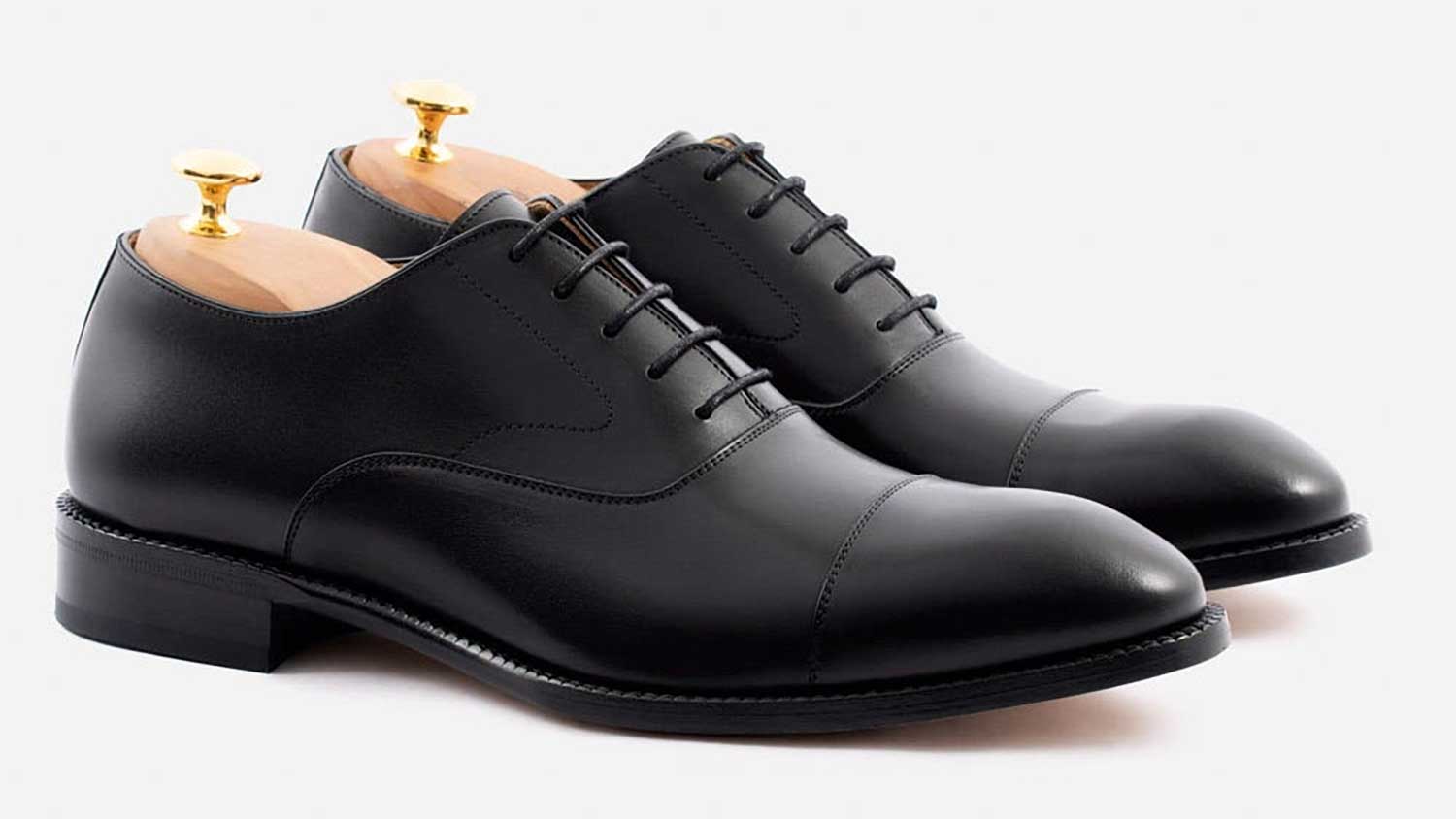
While Hurtado and Niño used Argentinian leather in the early days, they’ve moved away from it because it just didn’t live up to either customer expectations or their own. Today, Beckett Simonon uppers are made using full-grain calfskin from Gruppo Mastrotto, a tannery based in Arzignano, Italy.
The leather is, from my armchair quarterback perspective, excellent for a $200 shoe. It’s supple and pliable, and there are no visible blemishes, pockmarks, or signs of sanding or grinding to remove imperfections.
The midsoles are fully lined in full-grain Vachetta leather. There is some natural cushioning, but there’s no cork midsole conforming to your foot the way, say, a pair of Allen Edmonds would.
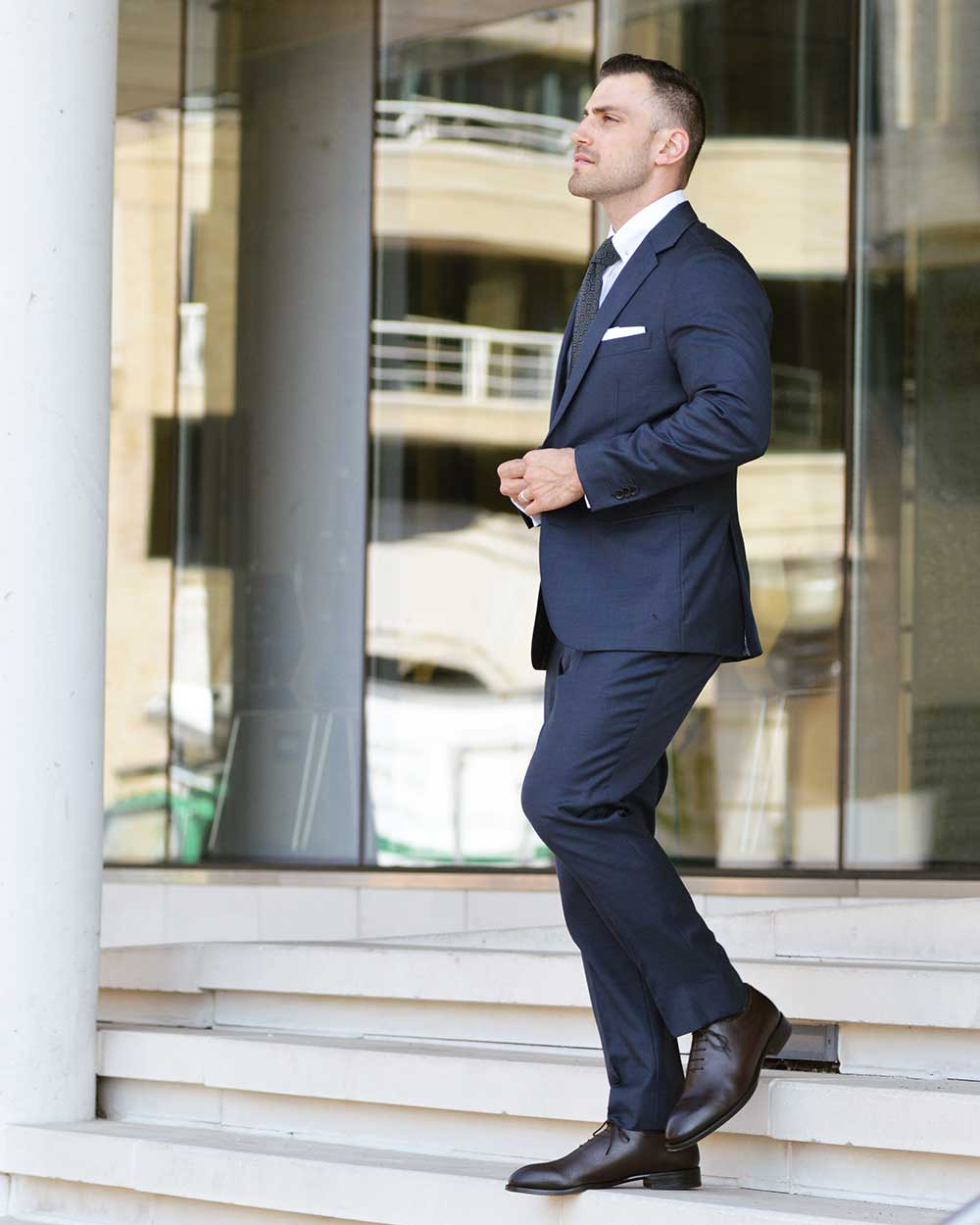
The outsoles are leather as well. They’re made from what is, essentially, a blend of bovine leathers compressed together using natural binders of mimosa, quebracho wood, and chestnut.
With that said, these are still $200 shoes and, despite cutting out middlemen and running a lean operation, manufactured to hit that mark. So, compared with a shoe retailing for around $400, the leather will likely not be as thick or as supple.
Construction is, frankly, excellent. The stitching is just as tight and even as some of my far more expensive pairs. I’ve experienced stitched shoes where shoddy workmanship has resulted in excess stitching poking the balls of my feet when walking. This isn’t the case here. And, each pair of Oxfords I’ve had has held up beautifully over the nearly three years I’ve had some of them.
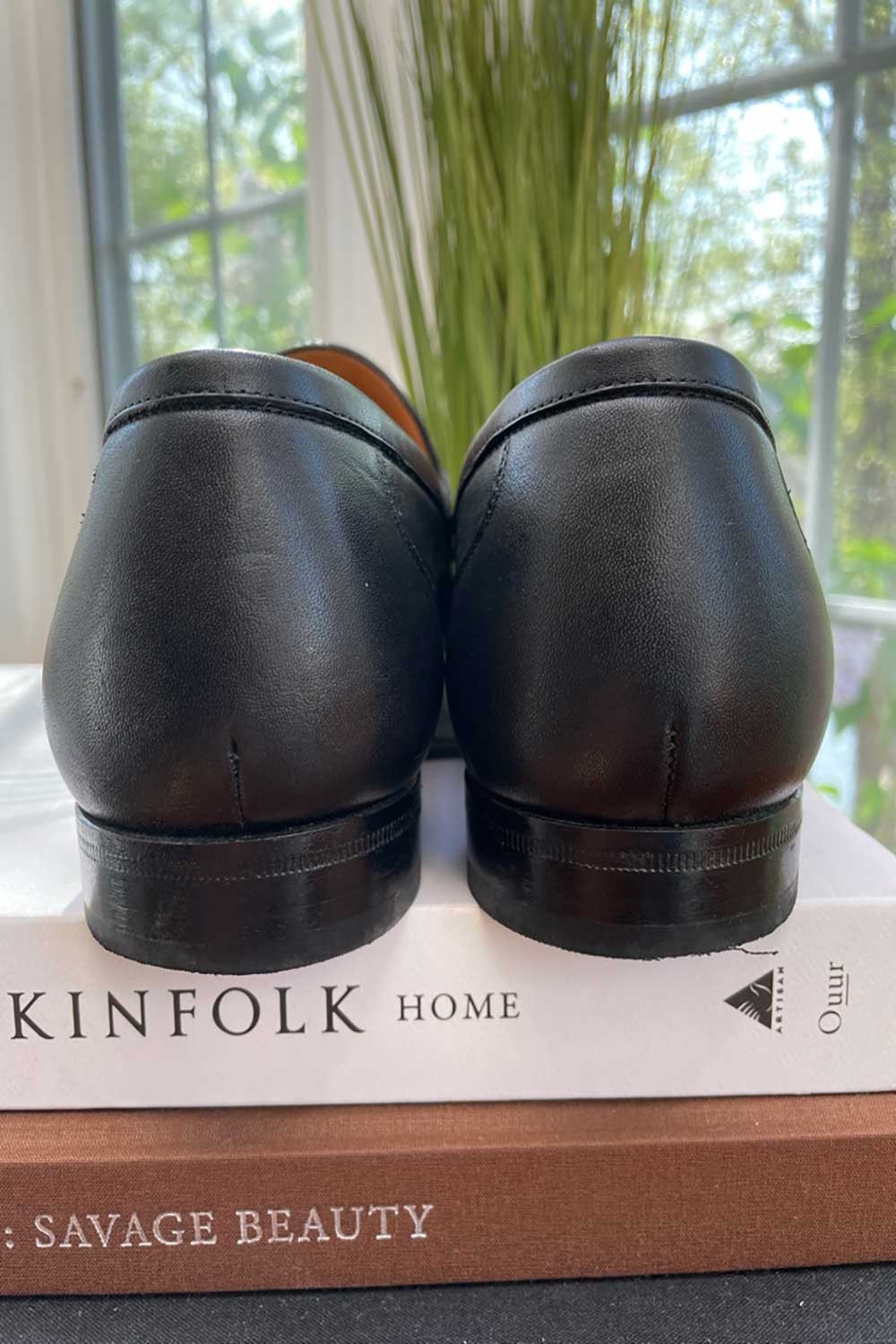
However, I would resist the temptation to polish too frequently. Each of my smooth leather Oxfords have arrived beautifully polished and coated with carnauba wax. But, in an attempt to take one pair’s shine to the next level, I found quite a bit of the polish came off! A clear coat restored most of the luster, though.
Comfort & Fit
“Comfort” is always a difficult topic to discuss, especially around shoes. Some guys like their shoes like a pair of raw denim — something broken in over a few wearings to conform to the contours of their feet. Others want a soft, squishy kind of ride right out of the box. Me? I’m somewhat in-between. I recognize truly high-quality leather may take a little to break in. But, I’m not willing to sit through a week of blisters on my heels.
Beckett Simonon has built in a nifty detail to counter this common problem in dress shoes. The inside of the heel has a little patch of roughout leather stitched into it. This creates a surface for your socks to catch and stop sliding around as you walk. No slipping, no rubbing, and no blisters.
I found Beckett Simonon Oxfords to be pretty comfortable out of the box. It was quite tight on the vamp for the first couple of hours and left quite a big gap in the facing. But, with little time, the leather began to stretch and mold to my foot. By the third or fourth wearing things had loosened up quite nicely and the upper had begun to mold around my foot. Six wearings in, they began to feel like an old friend.
That is, of course, when I found the right fit for me. I’m a 10B on a Brannock device, which means I need a narrow shoe. While I do appreciate the narrow waist on Beckett Simonon’s Oxfords, they only come in standard “D” widths and are loosely based on Allen Edmonds’ 65 last (what the classic Allen Edmonds Park Avenue sits on.)
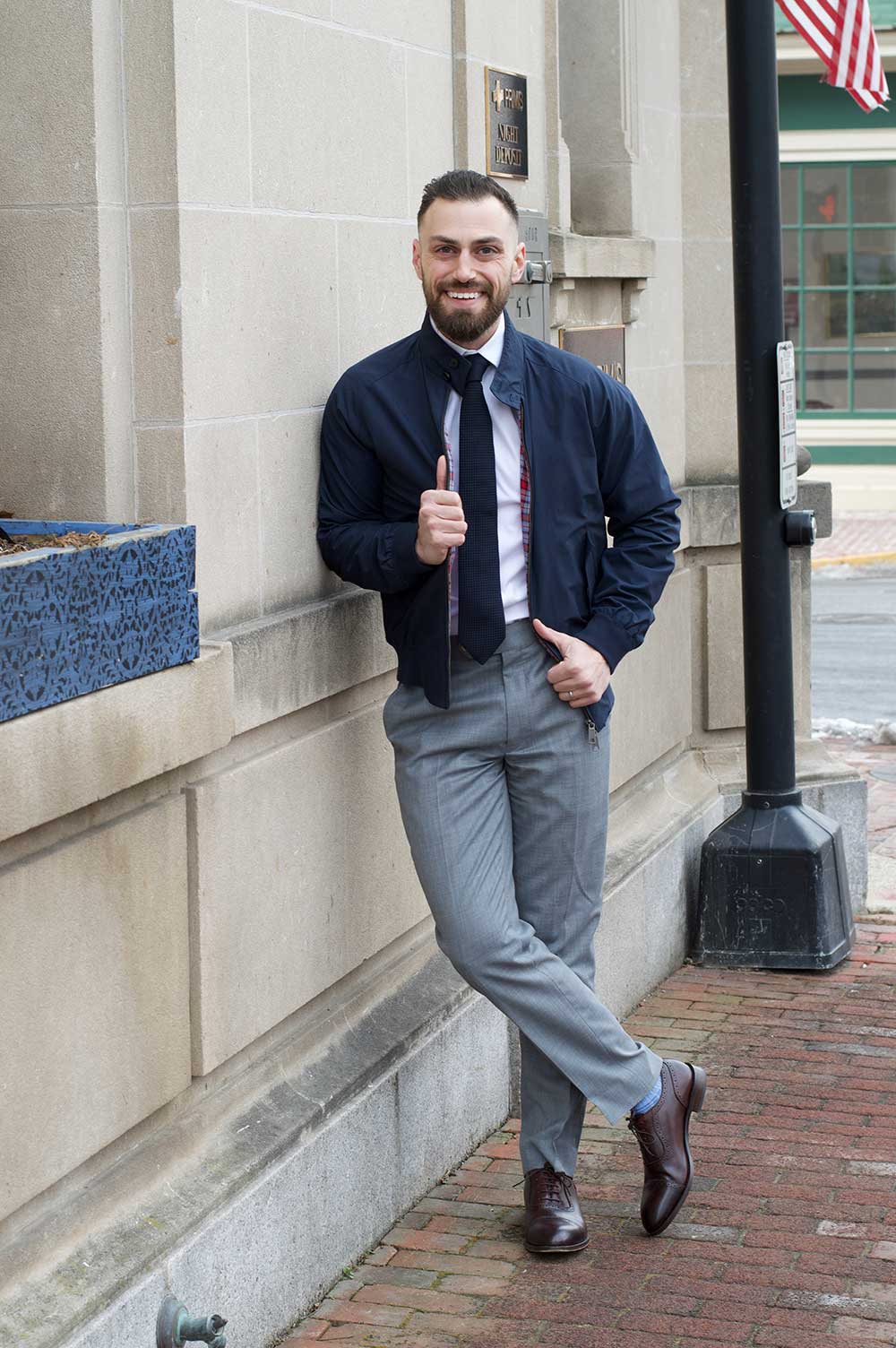
A standard 10 in these shoes is okay for me lengthwise, but leaves quite a bit of gapping around the mouth. If you’ve got an average width foot, you should be just fine with your normal size. But, my narrow foot means I need to take a full size down to a 9. Even with that, I’ve got plenty of room to wiggle my toes around — and no gapping at the sides. If you’re a fella with a wider foot, try going half a size up on the lace-ups.
Style & Design
Beckett Simonon’s Oxford selection has seemingly doubled even in the last three years. What was once just captoes and wingtips is up to, at the time of writing, 12 styles to include austerity Oxfords, two kinds of Adelaides, and wholecuts. They’re offered in five different colorways, from a classic black to not-quite-brown-not-quite-tan “oak” finish.
Beckett Simonon seems to be able to roll out so many varieties because they use a similar last for many of the models. Look at the tip of the toe box and you’ll see a slightly raised ‘bump’ on nearly all of them. It would appear both easy and cost-effective to spin up a new variant.
This isn’t to say these are cookie-cutter shoes, though. While at first glance, these look to be classic Oxfords in a kind of hybrid between English and American styles, each one of the Oxfords has its subtleties.
Consider the most conservative of these- the “Dean” in black. The toe cap extends much further up the vamp than Allen Edmonds’ Park Avenue model. This gives the impression of a longer, more elegant shape to the foot.
Or, take my current favorite, the “Durant” in Bordeaux/burgundy. It has the same extended toe cap and slight almond toe as the Dean for that lovely shape, but also some additional elements. Both the heel and toe feature broguing and pinking, and the upper vamp features a U-shaped ‘Adelaide’ design. Some may consider this quite busy, but I think it creates an interesting look without going too far. It’s an Oxford! It’s a Brogue! It’s a…Broxford?
The Verdict
Having owned four pairs of Beckett Simonon Oxfords over the last three or so years, I can say they’re well worth it and punch far above their price point. The leather isn’t amazing-but, in my view, it is superior to a standard shoe from Cole Haan or Johnston & Murphy.
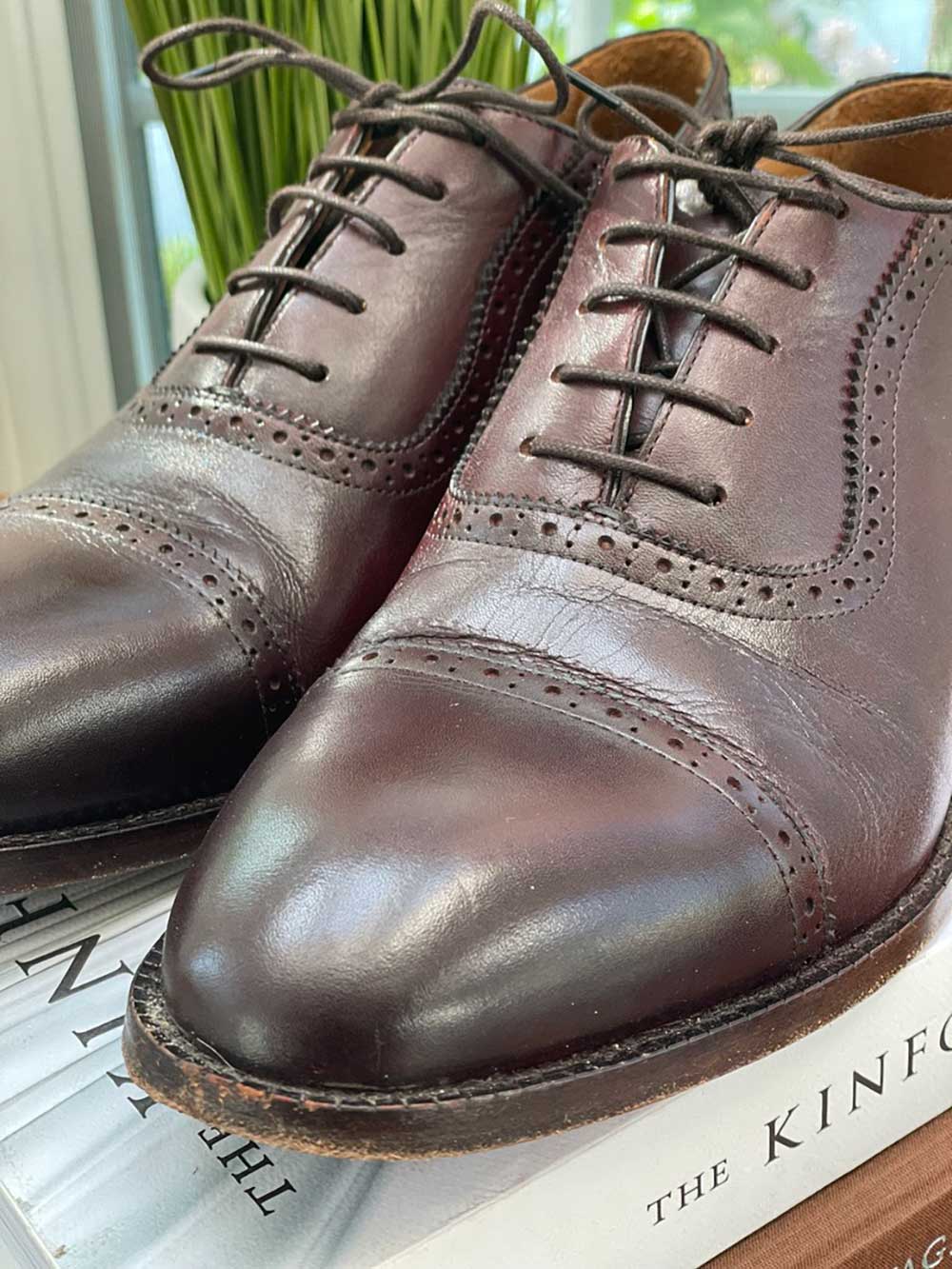
The styles are versatile and easy to wear in a variety of scenarios. However, I would gravitate toward darker finishes on the Oxfords. The ‘oak’ is somewhat similar to the ‘coffee brown’ from Allen Edmonds. While the ‘tan’ may, in theory, be close to Allen Edmonds’ ‘walnut’ finish, in my experience the colorway borders on orange.
They will largely run true to your normal dress shoe size if you have a standard foot. If you’re like me and have a narrow foot, consider taking at least a half-size down, if not a full size; gents with wider feet should look to take a half-size up.
Err on the side of a little snug at first, as the leather will stretch and conform to your foot over three or four wearings. When properly sized, then, the Oxfords are well worth it.
Beckett Simonon Loafers
Beckett Simonon Loafers
BLUF: Beckett Simonon’s loafers aren’t our favorite, but one reason is because of our narrow and flat foot. If you have a regular D-width foot and enjoy the various styles on offer, a pair might be just the thing for you.
Quality & Construction
The loafers from Beckett Simonon are made with the same Italian leather as the Oxfords. I’ve found the materials to be of similar quality, if not better. The upper on my current pair is actually quite soft, and feels marginally thicker than my Oxfords. The sole is the same leather mixture as the Oxfords. And, the lining is the same as well. The stitching is the same consistent, even spacing all the way through. The heel is nicely secured.
The only issue with the loafers comes from the horsebit itself. The hardware feels a little cheap and can jingle annoyingly when I walk up steps. That’s a minor quibble if anything, though.
Comfort & Fit
I took the same size (9) in the loafers as I did in the lace-ups. As a guy with feet that are not only narrow but quite flat, loafers are usually the most difficult to find the right fit in many standard/D width shoes. If I find the right length, it’s usually too wide and gaps at the side when I walk. Sizing down can solve that problem, but can also pinch my toes.
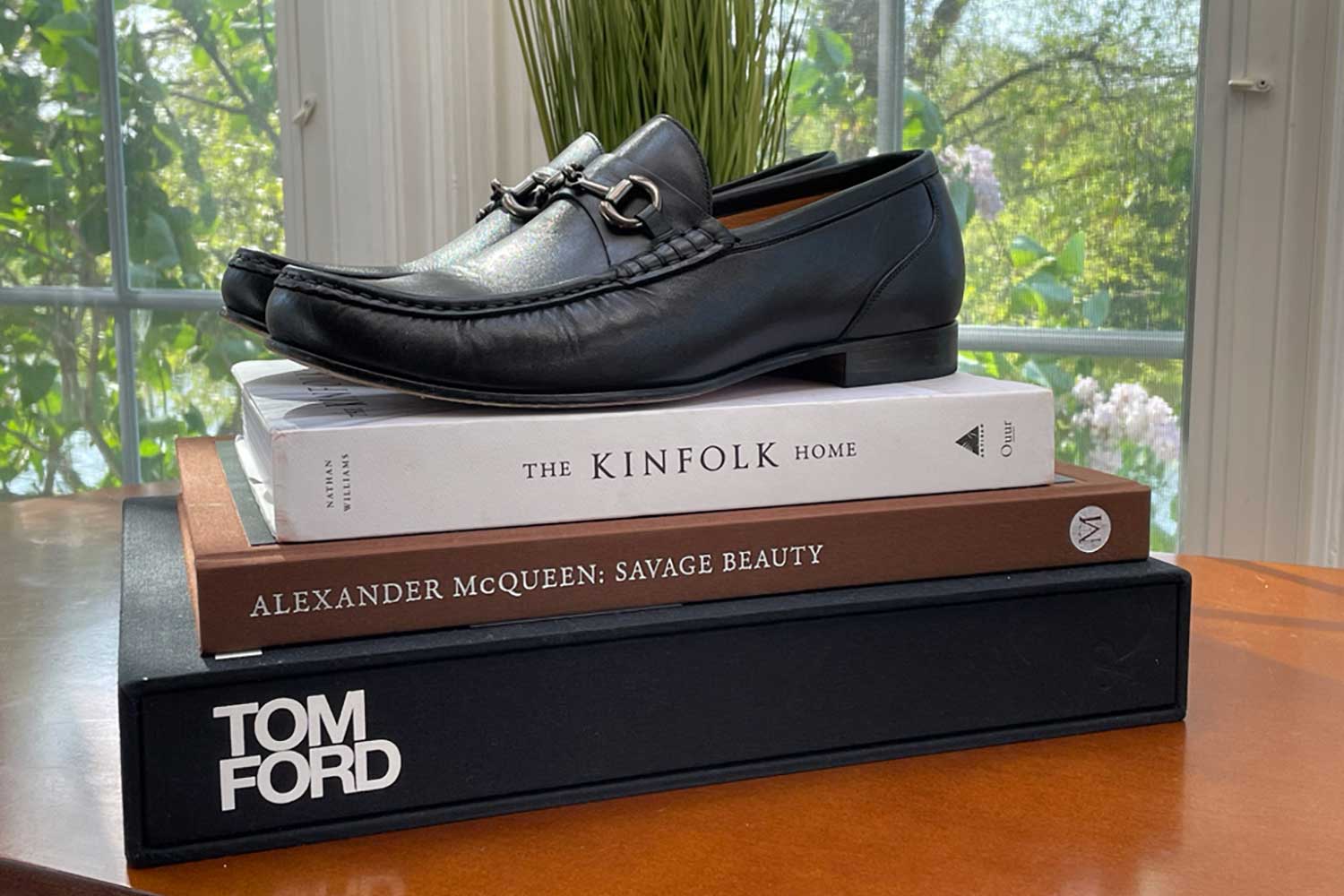
This last, in a 9, is definitely shorter than my dress shoes in the same size. As a result, my toes come a little closer to the end than I’d prefer. But, wearing thin dress socks or even going sockless has largely dealt with the issue. If you’ve got an average foot, though, taking your normal loafer size will be just fine.
For me, then, these aren’t the most comfortable Beckett Simonon shoes. But, if you’ve got an average foot, taking your normal size should be just fine. As with the Oxfords, there’s no cork in the midsole or any kind of foam. That still shouldn’t be a dealbreaker for many.
Style & Design
Beckett Simonon offers two very different styles of loafers. The “Beaumont” is a classic penny loafer shape with a horsebit detail, and the “Bernard” tassel loafer and “Cohen” penny loafers have elongated toe boxes.
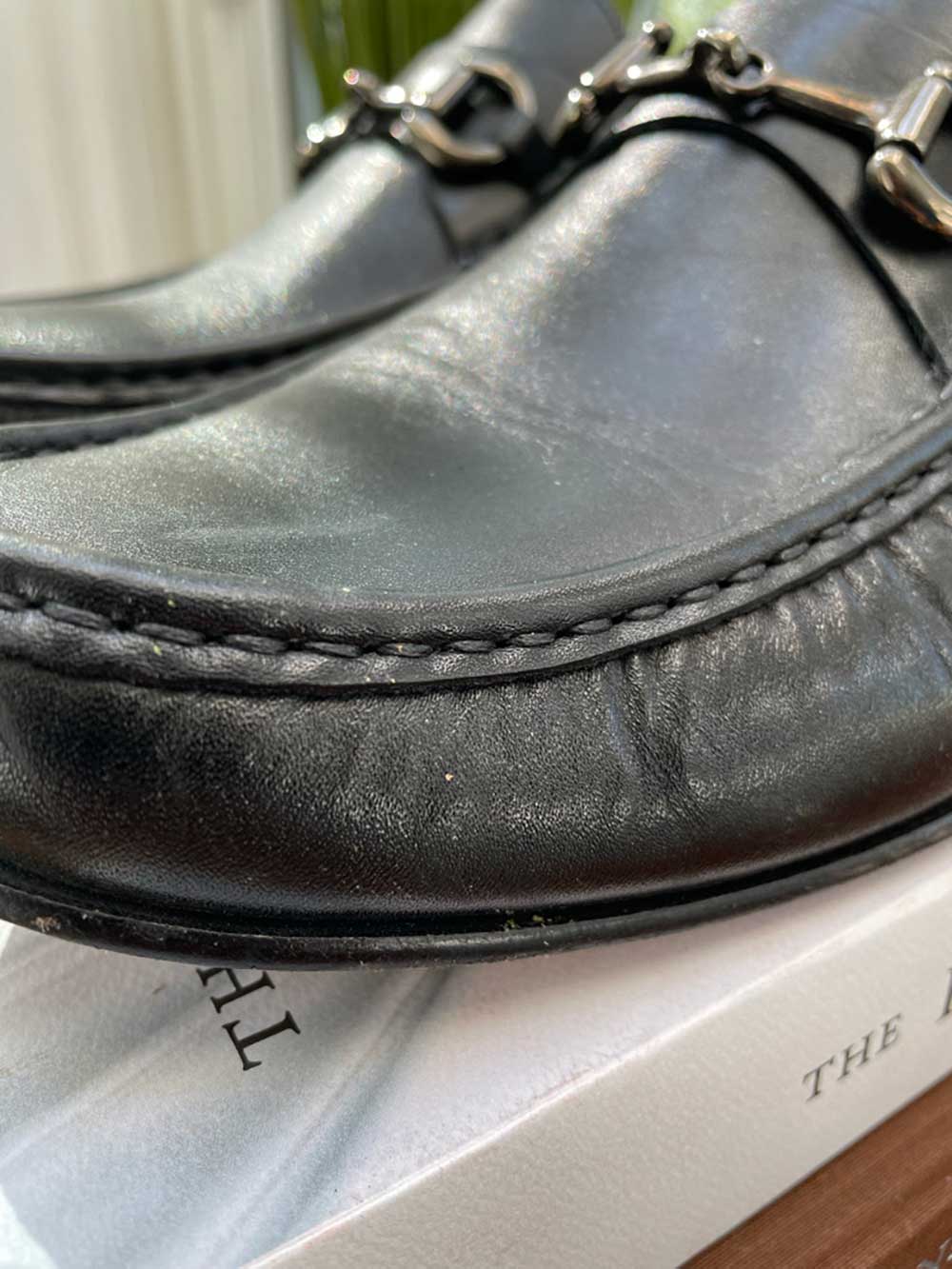
The Beaumont’s shape and detailing is reminiscent of the iconic Gucci 1953 loafer. A slightly shorter toe box and smaller vamp means it isn’t quite as streamlined as the original, but the homage is definitely clear. True menswear nerds may be able to spot the differences, but the general public will consider them an interesting pair of shoes.
That’s especially true if you get them in “pull-up” leather. Also called waxed leather and similar to the name-brand ChromExcel, this is a finishing technique where hot oils and waxes are applied to the hide during the tanning process, which can take as long as six weeks to do. What results is a unique effect where you can see the oils move around in the leather when it is pulled or stretched- hence the name. It’s usually applied to work boots and bags, but could make for an interesting finish on some loafers.
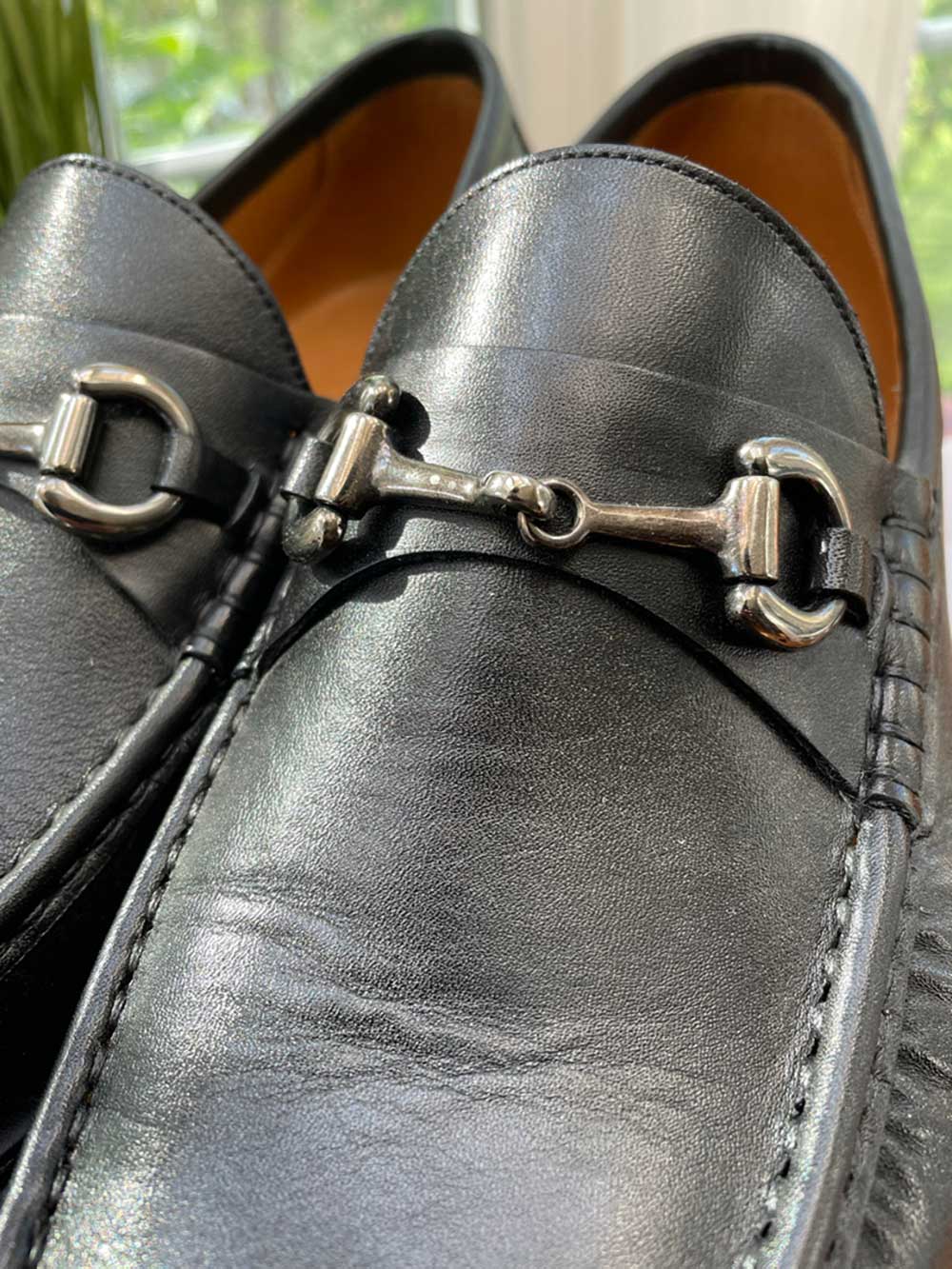
The Bernard and Cohen models are slightly more unusual, and I must admit I’m not a fan. They look nice in the product photos, but just don’t sit right with me when I put them on. The toe box is too long and makes my foot look boat-like. The tassel on the Bernards look out of place, as if the styling is trying too hard to be ‘classic’ and ‘modern’ at the same time. And, the heel is far too clunky for a refined shoe.
Scaling each of these features down — a shorter toe box, less-dandy tassel, and a more elegant shape on the heel would make for a far better shoe. In short, the Allen Edmonds Grayson model.
The Verdict
With two different styles currently on offer, Beckett Simonon can accommodate a wide range of guys. If you like a Gucci-type loafer without the luxury markup, the Beaumont might be a good option for you. But, I’d avoid the Cohens and Bernards, as this line seems to be trying to mash two different styles together.
Beckett Simonon Boots
Beckett Simonon Boots
While the rubber outsole leaves a little to be desired, I’ve found the boots to be well-made with excellent materials and to fit very well. I can wholeheartedly recommend them.
Quality & Construction
A good quality boot should be in every man’s wardrobe. Ideally, they should be welted, with a full-grain leather upper, stacked leather heel, brass or other metal eyelets and speed hooks, and durable rubber outsole. Of course, these can come in at quite the cost, with many retailing for north of $400 or, in some cases, $500 or more. How does Beckett Simonon stack up?
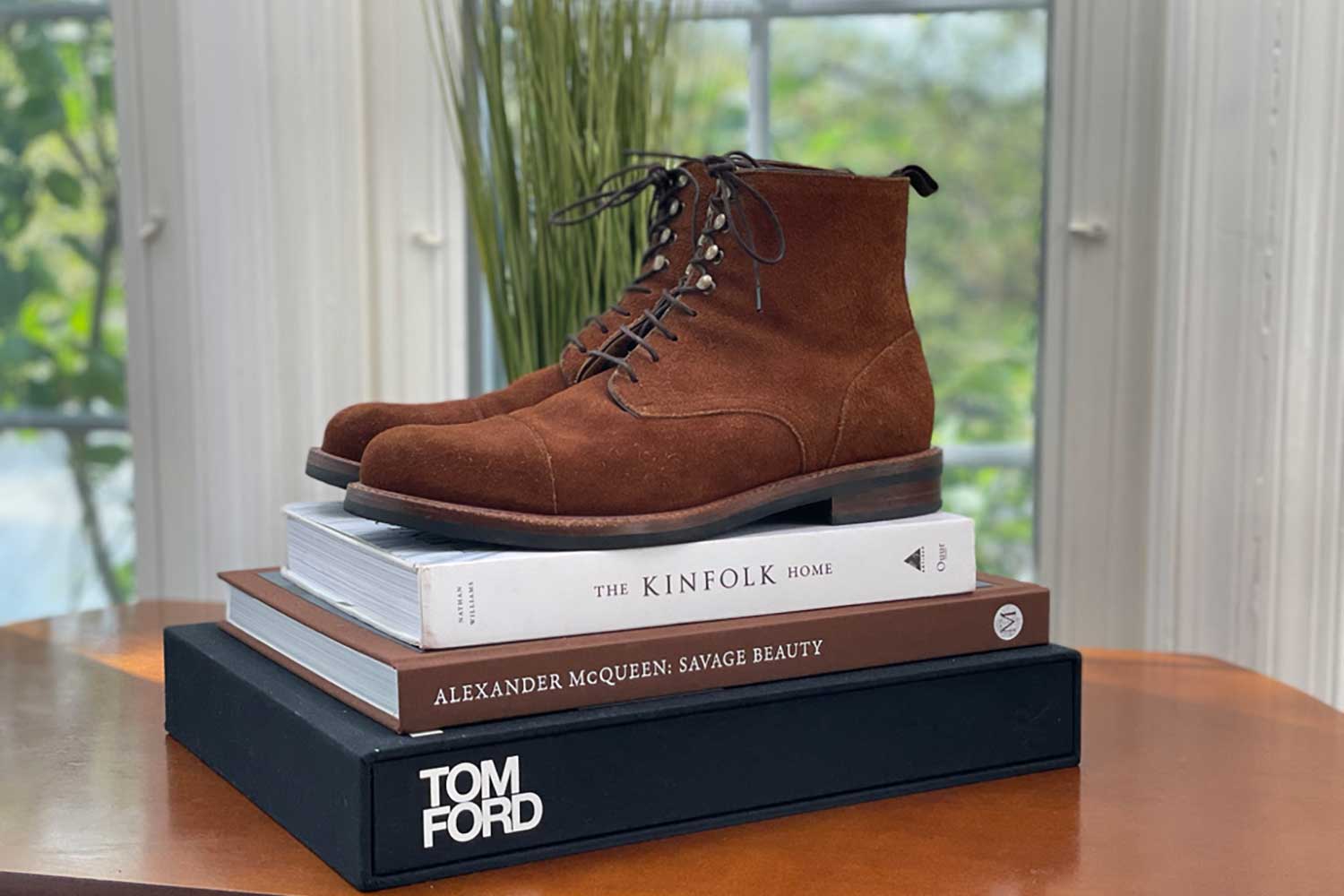
Beckett Simonon’s boots are not welted, but instead Blake stitched like their dress shoes. On one hand, this may lack some of the branding and shelf appeal that a Goodyear welted boot would have. On the other, the stitching may actually help the boots break in more quickly. In my experience, it hasn’t really made a great deal of difference. I’ve worn a pair of the Dowler boots for nearly a year now and the construction has held up beautifully.
Though it seems somewhat contradictory, I’d always wanted to try a pair of suede boots. The boot, of course, is designed to be functional and take quite the beating. How would a more delicate material like suede hold up, particularly in adverse weather conditions?
I’m pleased to report this has been successful. The suede on my pair is an excellent blend of being soft while maintaining its shape. It isn’t as nappy as some of my suede dress shoes (including my pair of Beckett Simonon suede Oxfords), but I suppose that’s a trade-off for weatherproofing the uppers.
The hardware is also a place where brands can cut corners, and it doesn’t look like Beckett Simonon did that here. The brass backing on the eyelets are securely in place, and I couldn’t bend the speed hooks even if I tried.
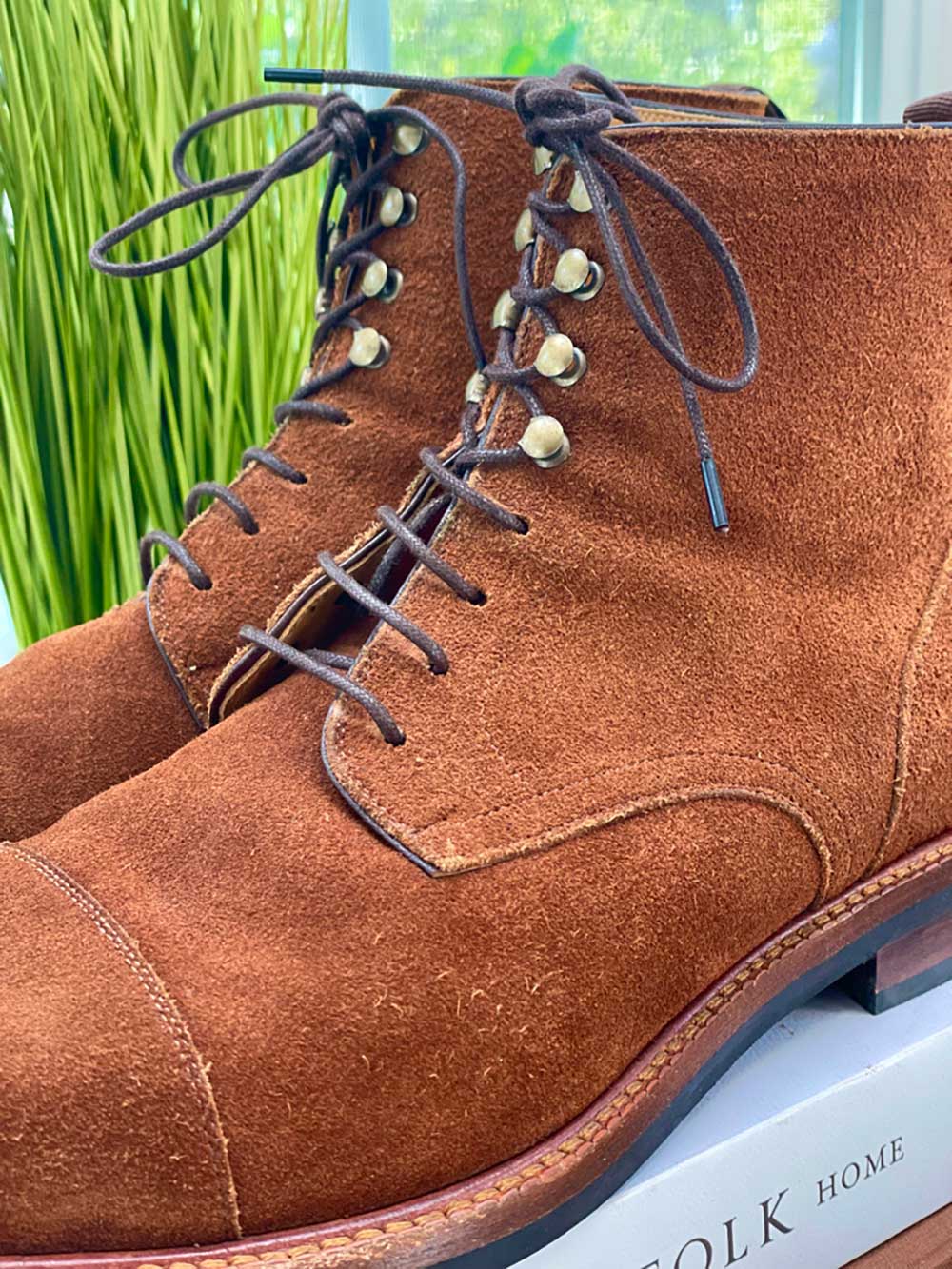
Two minor gripes on construction: First, while the SBR rubber sole is fine enough and has performed well, I have felt soles of better quality and slightly better traction at similar price points. Secondly, the pull tab at the back also feels thin and kind of cheap. But, as I’ve been able to pull the boots on without it, it’s far from a dealbreaker for me.
Comfort & Fit
As with the dress shoes, I’ve found Beckett Simonon’s boots to be quite comfortable. Like the shoes, there’s no cork midsole or foam layer on the inside. But, the leather lining is more than soft enough, and there’s plenty of padding to cushion the ride.
This lack of a foam layer on the inside has actually been a good thing. For instance, I’ve had a pair of Thursday Boots with a ‘comfort strip’ of EVA foam layered underneath a leather lining. While, in theory, it’s a great idea (and results in a supremely comfortable boot at first), after about six to eight months of wear, that strip compresses and results in a pretty firm ride in the end.
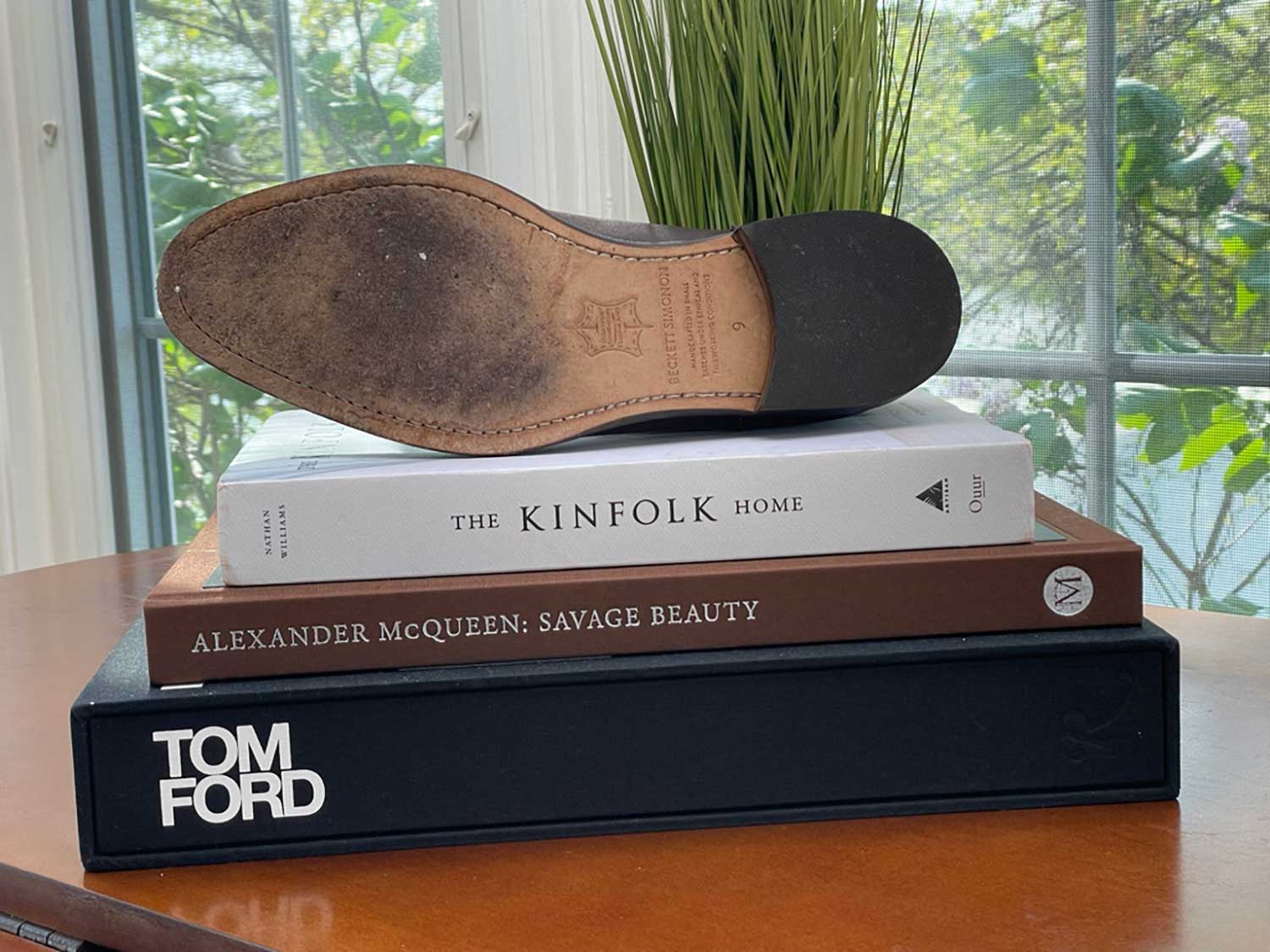
I also found the fit on my boots to be a little different than the lace-ups and loafers. In most cases, taking a half-size smaller on boots is usually a good rule to follow. While a 9 is definitely my size in Oxfords and probably my best size in the loafers, I was mistakenly sent a 9.5 in the boot. I tried them on and, to my delight, they fit wonderfully with a pair of boot socks. I suspect the reason is the higher shaft on the boot mitigates any potential gapping issues. However, if you have standard ‘D’ width fit, taking your normal boot size should be just fine.
Style & Design
Like their Oxford selection, Beckett Simonon offers quite the range of boots in smooth leather, pull-up leather, and suede. There’s my Dowler, which is a slightly refined combat-style boot. Then, there are wingtips, derby-style boots, Chelseas, dress boots, and one appearing to be a more refined version of Alden’s iconic “Indy” boot.
All this choice can be kind of overwhelming — but, from my outside view, it looks like bootmaking is where the company has really invested their R&D. It’s safe to say, then, Beckett Simonon will likely have a boot to suit your style.
Colorways are offered in mostly the same names and finishes as their dress shoes. I found my ‘chesnut’ colorway on the Dowler to have a slightly orangish undertone. While that’s something I wouldn’t seek out in my dress shoes or loafers, I think it lends a rugged appeal.
The Verdict
While my dress shoes from the company have definitely gotten more wear, I’m more and more intrigued every time I visit the website and see new styles popping up. I suppose because everything is indeed made-to-order, the company can afford to experiment and make something like a balmoral boot. While the rubber outsole leaves a little to be desired, I’ve found the boots to be well-made with excellent materials and to fit very well. I can wholeheartedly recommend them.
Beckett Simonon vs. Allen Edmonds
Now, let’s consider Beckett Simonon against the perennial powerhouse of Allen Edmonds in the same categories of Quality, Construction, Fit, and Design.
A favorite of US Presidents and business executives, Allen Edmonds is a heritage brand long-regarded for its quality materials and attention to detail. As the primary supplier of boots and shoes to the US Army during the Second World War, the company gained a loyal following that continued well into the 1980s and 1990s. However, with increasingly relaxed workplace dress codes and the retirement of much of their customer base, the brand had to reinvent itself to target a younger audience as it approached its 100th anniversary in business.
Such change hasn’t come easy. Allen Edmonds was bought by a private equity firm in 2013 and then sold in 2016 to Caleres, the parent shoe company of brands like Sam Edelman, Famous Footwear, and Naturalizer. But, quality control issues had been looming since before the sales, and many longtime fans began to take notice.
Today, the brand is doubling down on “Made in America” and relying on their heritage as an iconic American company. The vast majority of the shoes are still produced in Port Washington, Wisconsin, though a small number of them are at least partially constructed in the Dominican Republic.
While they aren’t as transparent as Beckett Simonon on where they source their calfskin from (the website just says “ultra-refined, premium European calfskin uppers…whatever that means), they are at least full-grain. AE does say, however, where their other materials come from: the suede is from England’s CF Stead and the shell cordovan from Chicago’s Horween tannery.
In my experience, Allen Edmonds still does produce quality footwear with good materials. While I no longer have any of their Oxfords in my collection, I do have two pairs of Grayson loafers. The leather upper is noticeably thicker than Beckett Simonon, and the colorways a little richer. The upper takes and holds polish better, too, producing an attractive shine.
As for construction, the 48 pairs of hands and 212 steps have done a good job on both of my current pairs. The stitch density is tight and even, the Goodyear welt is well done, and the stacked heel is securely nailed in. Each pair has held up well through a few years of wear, and I have the feeling they’ll last for quite a few more.
I’ve also found my Allen Edmonds pairs to be quite comfortable, but not measurably more than my Beckett Simonon ones. Brand loyalists rave about the cork midsole, but I consider it more a ‘nice-to-have’ than a necessity. But, at the end of a long day on your feet walking a tradeshow floor, it is really, really nice to have!
Fit is an area where Allen Edmonds has a clear advantage over Beckett Simonon. They offer anything from a 5AAAA (extra narrow) to 16EEE (extra wide). Beckett Simonon isn’t able to compete with that as they only offer standard D width. As mentioned earlier, I’ve not had any issues taking a smaller size to accommodate my narrow foot- but it is nice to be able to order a 10B from Allen Edmonds and know it will fit.
Allen Edmonds offers Oxfords, Derbies, Loafers, Sneakers, and Boots in a wide range. They are quite conservative in their style and design, though, and the lasts are definitely less elegant across the board than Beckett Simonon’s. But, they’re classic for a reason, and will look just as stylish 10 years from now.
I prefer the styling on Beckett Simonon’s Dean Oxford to Allen Edmonds’ Park Avenue. For me, the toe cap is oddly short, leading to a kind of squat and stubby look. However, I’d choose the Allen Edmonds Grayson for a pair of tassel loafers and the Dalton for a pair of wingtip dress boots.
Bottom Line: Are Beckett Simonon Shoes Worth It?
Ultimately, it comes down to your budget and your style. Is a pair of Beckett Simonon shoes, at roughly half the retail price of Allen Edmonds, worth the wait? If you have standard D width feet, probably.
Allen Edmonds still does make a very good shoe with excellent materials. But, given recent quality control issues, $395 for a pair of Oxfords is pretty steep. However, during one of their spring and fall sales events, you can snag a pair of dress shoes for around $250.
With Beckett Simonon, you’re going to get a shoe with excellent materials and construction. The designs are fresh and modern, but still versatile with a full range of Oxfords, Loafers, and a wide variety of boot styles even many global brands don’t offer. And, like most brands these days, the MSRP isn’t the end price. The company will send you a code for 20% off for simply entering your email, which takes you well south of $200.
It is also worth considering the lead time. Allen Edmonds has many retail locations around the United States, and it’s easy to go in, get sized, and walk out with your new pair. If they don’t have your width in store or available online, one can be made and shipped to you in under a month. Beckett Simonon takes between three and four months to arrive. While some may balk at this prospect, I’m actually in agreement with the rationale.
Waiting for your purchase encourages one to be more intentional with what they buy. If you’re buying from Beckett Simonon, you’ve likely taken the time and effort to browse the site and come up with a variety of ways to wear your shoes. Versatile shoes get worn instead of taking up space on your shelf and, ultimately, ending up in a donation pile or in landfill.
But, good materials, great design, a great message, and accessible price point don’t mean much if the shoe doesn’t fit. If you have quite narrow or quite wide feet, Beckett Simonon isn’t a realistic option for you yet. I’ve found I can get a good fit and accommodate my narrow feet by taking a whole size down — but you may have issues. If that’s the case, Allen Edmonds truly is one of the companies still able to adequately size such a broad range of men, and will be your go-to.
For me, though, this upstart company with a good message gives the stalwart brand quite a run — and is well worth it.
The post An Honest Review of Beckett Simonon Shoes first appeared on the men’s style blog He Spoke Style – Men’s Style, Fashion, Grooming, Tips and Advice


